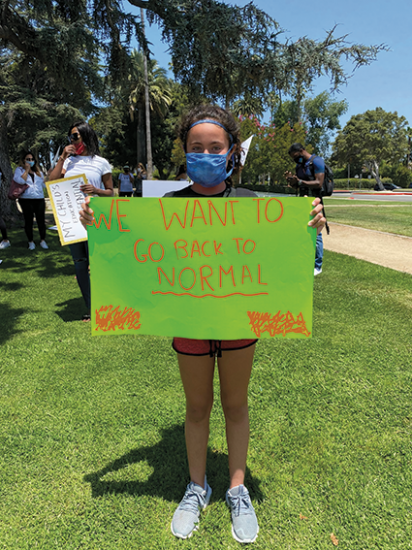
The image that accompanies [this article](https://beverlypress.com/2020/07/beverly-hills-protesters-want-in-person-classes) on a school reopening protest captures a major mood in July 2020.
The photo comes courtesy of Victoria Conti, who is also quoted in the piece:
> I don’t want my kids to stay in front of a computer all day long. It’s not good for health, for mental health, there are too many reasons that it’s not good.
Conti is right, of course. It’s not healthy for any of us to sit in front of computers all day, particularly children.
My daughter is 15. Like most American kids, she finished her school year in Zoom classes of debatable quality. I want her back in school with her friends, just like I wanted her to go to her beloved sleepaway summer camp, and to be able to hug her grandmother.
Just like the girl in the photograph, *I want to go back to normal.*
But it’s simply not possible. Normal is not an option. Not now. Probably not until there’s a widely-available treatment or vaccine.
Demanding a return to normal in July 2020 is like yelling at the night to be less dark. It’s out of your control and everyone’s control. The more you complain about it, the more miserable you make yourself and others, and the more time and energy you waste.
Conti’s frustration about online classes is valid and understandable. I share it. But the real opponent isn’t the school district; it’s the coronavirus. That’s the barrier between teachers and students and in-person classes resuming. The virus doesn’t care because it’s a lump of genetic data. Scientists and public health officials care deeply but they can’t offer a cure at the moment.
In psychology, one strategy for dealing with these situations is [radical acceptance](https://www.betterhelp.com/advice/therapy/what-is-radical-acceptance-and-how-can-it-help-me/). You start by acknowledging the reality of the situation — and how much it sucks — so you can begin thinking about the future.
– It sucks that we can’t open most schools safely, so we need to work on ways to make online classes more accessible and less terrible.
– It sucks that we can’t go to bars and clubs and movies, so we need to find other ways to hang out and socialize that don’t spread the virus.
– It sucks that some jobs aren’t possible amidst the pandemic, so we need to find other ways for people to pay their bills.
– It sucks that we have to wear masks and yet it’s clear that they [save a lot of lives](https://www.wsj.com/articles/face-masks-really-do-matter-the-scientific-evidence-is-growing-11595083298).
Individually and as a society, we need to move past this idea of “back to normal” when it comes to coronavirus. Stop saying it. Stop pretending it’s an option. It’s night and the sun’s not coming up any faster. We need to do the best we can in the dark.
And we can do surprising things! For example, American retailers quickly adopted contactless payment and curbside pickup, along with a staggering amount of plexiglass. Businesses realized that a lot of work can be done from home. Talk shows figured out how to film from attics.
We’ve been forced to rethink and adapt because normal was not an option. It still isn’t. We need to acknowledge that this pandemic sucks and keep going.